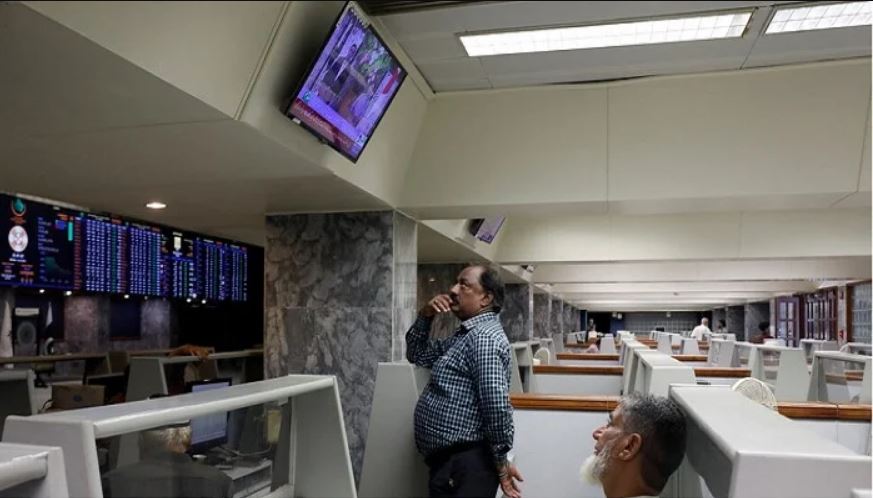By Ali Imran
ISLAMABAD: Stocks on Monday raced past the record high of 84,900-points mark, driven by a massive rally in the energy sector and an evergrowing optimism over potential interest rate cuts, traders said.
Pakistan Stock Exchange’s (PSX) benchmark KSE-100 Shares Index ended at an all-time high of 84,910.29 points, up 1,378.34 points, or 1.65% agaisnt its last close of 83,531.96 points on Friday.
In a post-market note, brokerage firm Arif Habib (AHL) reported that the stock index started the week with strong gains, as 73 stocks advanced and only 23 declined during Monday’s bullish run.
According to the report, Oil and Gas Development Company (OGDC) (+7.66%), Pakistan Petroleum (PPL) (+6.82%), and Fauji Fertilizer Company (FFC) (+2.53%) were the main contributors to the index gains.
PPL announced that its subsidiary, PPL Asia, has settled with Iraq’s Midland Oil Company and received $6 million (Rs1.665 billion), which translates to Rs0.61 per share, as stated by the brokerage.
The AHL report also mentioned that both OGDC and PPL showed improved collections from gas sales due to timely gas price revisions, leading to increased liquidity.
“We expect higher payouts for OGDC and PPL at Rs20/share and Rs15/share, respectively, while both companies are also pursuing capital-intensive projects like offshore drilling.”
The report added, “Near-term support is at 84,000, with higher prices anticipated.”
Samiullah Tariq, Head of Research and Development at Pakistan Kuwait Investment Company (Private) Limited, pointed to rising expectations of a rate cut as the primary driver, citing a continuous drop in the Consumer Price Index- (CPI) based inflation to single digits touching 6.9% in September.
Key sectors fueling the gains included automobile assemblers, cement, commercial banks, fertilisers, oil and gas exploration companies, and il marketing companies (OMCs).
Ahsan Mehanti, analyst at Arif Habib Corp said stocks were hovering around all-times highs led by blue chip oil scrips amid speculations in earnings season.
“Surging global crude oil prices, a slump in banking lending rates, and the government’s deliberation on the privatisation of SOEs (state-owned entities) played a catalytic role in the bullish activity at the stock exchange,” Mehanti added.
Heavyweights such as National Bank of Pakistan (NBP), Meezan Bank (MEBL), Fauji Fertilizer Bin Qasim (FFBL), Sui Northern Gas Pipelines (SNGP), and Pakistan State Oil (PSO) ended in the green zone.
On Friday, the benchmark index jumped by 810.19 points or 0.98% to 83,531.96 points, hitting an intraday high of 83,605.73 points and a low of 82,594.80 points.
Accoring to JS Research, the index has established a higher high and higher low, suggesting further upside potential.
Analysts note that investors have upped their bets on the scope of the State Bank of Pakistan (SBP) extending its ongoing hawkish monetary policy as inflation has been retreating steadily over the past months.
Moreover, there are expectations of a policy rate cut of up to 400 basis points by December, as the room for easing exists.
The market is abuzz with speculations that the SBP could revise the interest rates downward even before its next scheduled meeting.
They added that the much-anticipated beginning of central bank’s long-awaited rate-cutting cycle, has also rekindled foreign interest in the country’s capital market.
CPI-based inflation fell to 6.9% year-on-year in September 2024, the lowest since January 2021, down from 9.6% in August, driven by the high base effect, easing commodity and energy markets, and a stable currency, according to the Pakistan Bureau of Statistics (PBS).
Last month, the SBP’s Monetary Policy Committee slashed the key policy rate by 200bps to 17.5% from 19.5%, citing a steep fall in both headline and core inflation over the past two months.
Investors also gained confidence from SBP Governor Jameel Ahmed’s statement that Pakistan’s foreign exchange reserves had risen to cover two months of imports, following the receipt of the first tranche from the IMF’s $7 billion Extended Fund Facility (EFF).





